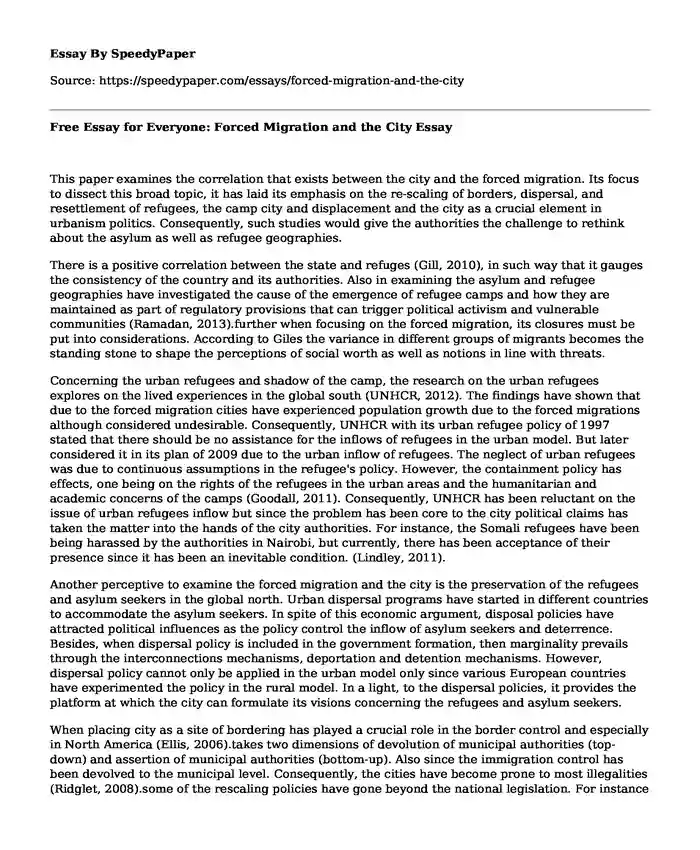
| Type of paper: | Course work |
| Categories: | Immigration |
| Pages: | 3 |
| Wordcount: | 757 words |
This paper examines the correlation that exists between the city and the forced migration. Its focus to dissect this broad topic, it has laid its emphasis on the re-scaling of borders, dispersal, and resettlement of refugees, the camp city and displacement and the city as a crucial element in urbanism politics. Consequently, such studies would give the authorities the challenge to rethink about the asylum as well as refugee geographies.
There is a positive correlation between the state and refuges (Gill, 2010), in such way that it gauges the consistency of the country and its authorities. Also in examining the asylum and refugee geographies have investigated the cause of the emergence of refugee camps and how they are maintained as part of regulatory provisions that can trigger political activism and vulnerable communities (Ramadan, 2013).further when focusing on the forced migration, its closures must be put into considerations. According to Giles the variance in different groups of migrants becomes the standing stone to shape the perceptions of social worth as well as notions in line with threats.
Concerning the urban refugees and shadow of the camp, the research on the urban refugees explores on the lived experiences in the global south (UNHCR, 2012). The findings have shown that due to the forced migration cities have experienced population growth due to the forced migrations although considered undesirable. Consequently, UNHCR with its urban refugee policy of 1997 stated that there should be no assistance for the inflows of refugees in the urban model. But later considered it in its plan of 2009 due to the urban inflow of refugees. The neglect of urban refugees was due to continuous assumptions in the refugee's policy. However, the containment policy has effects, one being on the rights of the refugees in the urban areas and the humanitarian and academic concerns of the camps (Goodall, 2011). Consequently, UNHCR has been reluctant on the issue of urban refugees inflow but since the problem has been core to the city political claims has taken the matter into the hands of the city authorities. For instance, the Somali refugees have been being harassed by the authorities in Nairobi, but currently, there has been acceptance of their presence since it has been an inevitable condition. (Lindley, 2011).
Another perceptive to examine the forced migration and the city is the preservation of the refugees and asylum seekers in the global north. Urban dispersal programs have started in different countries to accommodate the asylum seekers. In spite of this economic argument, disposal policies have attracted political influences as the policy control the inflow of asylum seekers and deterrence. Besides, when dispersal policy is included in the government formation, then marginality prevails through the interconnections mechanisms, deportation and detention mechanisms. However, dispersal policy cannot only be applied in the urban model only since various European countries have experimented the policy in the rural model. In a light, to the dispersal policies, it provides the platform at which the city can formulate its visions concerning the refugees and asylum seekers.
When placing city as a site of bordering has played a crucial role in the border control and especially in North America (Ellis, 2006).takes two dimensions of devolution of municipal authorities (top-down) and assertion of municipal authorities (bottom-up). Also since the immigration control has been devolved to the municipal level. Consequently, the cities have become prone to most illegalities (Ridglet, 2008).some of the rescaling policies have gone beyond the national legislation. For instance in the USA have adopted border control by restricting and removing illegal immigrants (Walker & Leitner, 2011). The cities as sanctuary would take the initiative of controlling the illegalities in the cities.
References
Ellis M (2006) Unsettling immigrant geographies: U.S. immigration and the politics of scale. Tijdschrift voor Economische en Sociale Geografie 97: 49-58.
Gill N (2010) New state-theoretic approaches to asylum and refugee geographies. Progress in Human Geography 34: 626-645
Goodall C (2011) Sanctuary and solidarity: Urban community responses to refugees and asylum seekers on three continents. New Issues in Refugee Research RP221. Geneva: UN High Commissioner for Refugee
Lindley A (2011) between a protracted and a crisis situation: Policy responses to Somali refugees in Kenya. Refugee Survey Quarterly 30: 14-49.
Ramadan A (2013) Spatialising the refugee camp. Transactions of the Institute of British Geographers 38: 65-77
Ridgley J (2008) Cities of refuge: Immigration enforcement, police, and the insurgent genealogies of citizenship in U.S. sanctuary cities. Urban Geography 29: 53-77.
UNHCR (2012) The State of the World's Refugees: In Search of Solidarity. Geneva: UNHCR.
Walker KE and Leitner H (2011) The variegated landscape of local immigration policies in the United States. Urban Geography 32: 156-178.
Cite this page
Free Essay for Everyone: Forced Migration and the City. (2022, Mar 22). Retrieved from https://speedypaper.com/essays/forced-migration-and-the-city
Request Removal
If you are the original author of this essay and no longer wish to have it published on the SpeedyPaper website, please click below to request its removal:
- Essay Example about Recidivism Rate of Child Sexual Assault Offenders
- Ellie Saab Case Study Essay, Free Example for Students
- Essay Example on the Business Performance
- Jean Piaget Theory - Free Essay in Developmental Psychology
- Essay Sample Describing the Challenges Associated with Domestic Terrorism
- Free Essay Describing Social Change Project
- Free Essay Sample: Product Overview of Salubite
Popular categories




